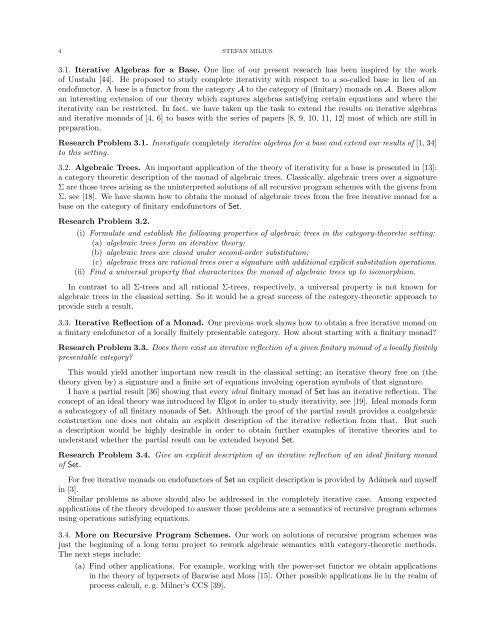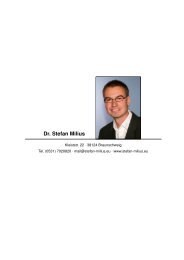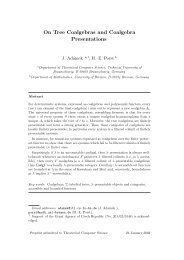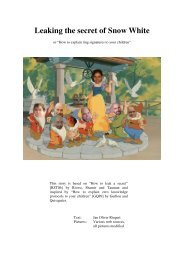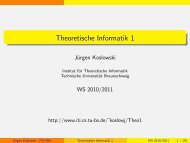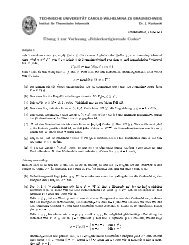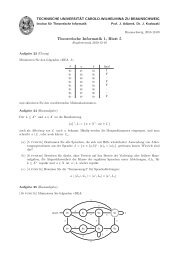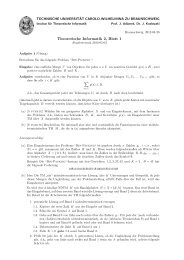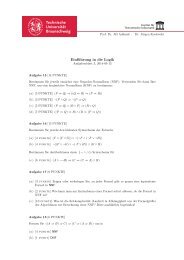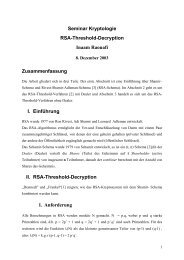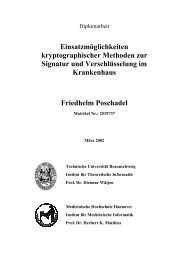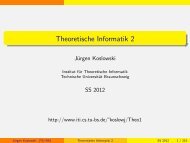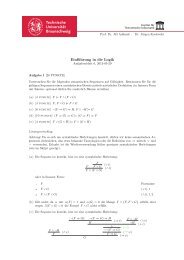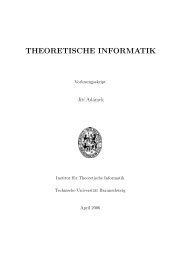RESEARCH STATEMENT My current research interests lie in ...
RESEARCH STATEMENT My current research interests lie in ...
RESEARCH STATEMENT My current research interests lie in ...
You also want an ePaper? Increase the reach of your titles
YUMPU automatically turns print PDFs into web optimized ePapers that Google loves.
4 STEFAN MILIUS3.1. Iterative Algebras for a Base. One l<strong>in</strong>e of our present <strong>research</strong> has been <strong>in</strong>spired by the workof Uustalu [44]. He proposed to study complete iterativity with respect to a so-called base <strong>in</strong> <strong>lie</strong>u of anendofunctor. A base is a functor from the category A to the category of (f<strong>in</strong>itary) monads on A. Bases allowan <strong>in</strong>terest<strong>in</strong>g extension of our theory which captures algebras satisfy<strong>in</strong>g certa<strong>in</strong> equations and where theiterativity can be restricted. In fact, we have taken up the task to extend the results on iterative algebrasand iterative monads of [4, 6] to bases with the series of papers [8, 9, 10, 11, 12] most of which are still <strong>in</strong>preparation.Research Problem 3.1. Investigate completely iterative algebras for a base and extend our results of [1, 34]to this sett<strong>in</strong>g.3.2. Algebraic Trees. An important application of the theory of iterativity for a base is presented <strong>in</strong> [13]:a category theoretic description of the monad of algebraic trees. Classically, algebraic trees over a signatureΣ are those trees aris<strong>in</strong>g as the un<strong>in</strong>terpreted solutions of all recursive program schemes with the givens fromΣ, see [18]. We have shown how to obta<strong>in</strong> the monad of algebraic trees from the free iterative monad for abase on the category of f<strong>in</strong>itary endofunctors of Set.Research Problem 3.2.(i) Formulate and establish the follow<strong>in</strong>g properties of algebraic trees <strong>in</strong> the category-theoretic sett<strong>in</strong>g:(a) algebraic trees form an iterative theory;(b) algebraic trees are closed under second-order substitution;(c) algebraic trees are rational trees over a signature with additional explicit substitution operations.(ii) F<strong>in</strong>d a universal property that characterizes the monad of algebraic trees up to isomorphism.In contrast to all Σ-trees and all rational Σ-trees, respectively, a universal property is not known foralgebraic trees <strong>in</strong> the classical sett<strong>in</strong>g. So it would be a great success of the category-theoretic approach toprovide such a result.3.3. Iterative Reflection of a Monad. Our previous work shows how to obta<strong>in</strong> a free iterative monad ona f<strong>in</strong>itary endofunctor of a locally f<strong>in</strong>itely presentable category. How about start<strong>in</strong>g with a f<strong>in</strong>itary monad?Research Problem 3.3. Does there exist an iterative reflection of a given f<strong>in</strong>itary monad of a locally f<strong>in</strong>itelypresentable category?This would yield another important new result <strong>in</strong> the classical sett<strong>in</strong>g; an iterative theory free on (thetheory given by) a signature and a f<strong>in</strong>ite set of equations <strong>in</strong>volv<strong>in</strong>g operation symbols of that signature.I have a partial result [36] show<strong>in</strong>g that every ideal f<strong>in</strong>itary monad of Set has an iterative reflection. Theconcept of an ideal theory was <strong>in</strong>troduced by Elgot <strong>in</strong> order to study iterativity, see [19]. Ideal monads forma subcategory of all f<strong>in</strong>itary monads of Set. Although the proof of the partial result provides a coalgebraicconstruction one does not obta<strong>in</strong> an explicit description of the iterative reflection from that. But sucha description would be highly desirable <strong>in</strong> order to obta<strong>in</strong> further examples of iterative theories and tounderstand whether the partial result can be extended beyond Set.Research Problem 3.4. Give an explicit description of an iterative reflection of an ideal f<strong>in</strong>itary monadof Set.For free iterative monads on endofunctors of Set an explicit description is provided by Adámek and myself<strong>in</strong> [3].Similar problems as above should also be addressed <strong>in</strong> the completely iterative case. Among expectedapplications of the theory developed to answer those problems are a semantics of recursive program schemesus<strong>in</strong>g operations satisfy<strong>in</strong>g equations.3.4. More on Recursive Program Schemes. Our work on solutions of recursive program schemes wasjust the beg<strong>in</strong>n<strong>in</strong>g of a long term project to rework algebraic semantics with category-theoretic methods.The next steps <strong>in</strong>clude:(a) F<strong>in</strong>d other applications. For example, work<strong>in</strong>g with the power-set functor we obta<strong>in</strong> applications<strong>in</strong> the theory of hypersets of Barwise and Moss [15]. Other possible applications <strong>lie</strong> <strong>in</strong> the realm ofprocess calculi, e. g. Milner’s CCS [39].


